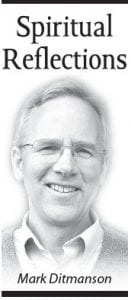In many churches all over the world this Sunday we will hear the story of the disciple we have unfortunately come to call “Doubting Thomas.” Of course it is quite appropriate fresh in the Easter season to hear the story of what happened just one week after the first appearance of the Risen Christ.
It is also appropriate in the season celebrating the resurrection and life beyond death to hear the story of someone who needed more proof in the face of such incredible news. In many ways the man we have come to know as Doubting Thomas becomes a wonderful talking point regarding how we come to faith, the stages of belief, and the place of doubt and inquiry in matters of commitment.
In the country of Finland many churches will have a special liturgy this week called the Thomas Mass, a seekers service. They will acknowledge that to be a Christian does not mean you have all the answers, rather that you may still have deep questions, and even troubling doubts. As you can imagine St. Thomas, the disciple who openly struggled with doubt, is a perfect role model for all who harbor deep sacred questions in the sanctuaries of their hearts.
One way of reading this story is to hear that the disciples that day welcomed their questioning friend in his struggle, and that Jesus welcomed his questions by coming directly to him. This story tells all the churches therefore that our doors are never to be closed to sincere questions of faith and that we all are still on a pilgrimage of deepening understanding. These doubts and questions about who Jesus was to them and to the world came from the inner circle of Jesus’ followers.
Every church today is still a fellowship where questions and convictions all have their place. Every church is still a place where a Nicodemus who wondered “how can this be?” (John 3:9) can come and seek. Every church is still a place where an anguished parent can cry, “I believe, help my unbelief.” (Mark 9:24) and God’s Spirit “interceding with sighs too deep for words,” will bring a comfort beyond our capacity to capture in human language.
I also think it is unfortunate that we call Thomas the doubter because that flattens the richness of the details of his fuller story. I call him Courageous Thomas when I read how he influenced the other disciples to join him in following
Jesus into danger. (John 11:16) I call him Thomas the Curious when Jesus describes the inexplicable in metaphors and Thomas asks for clarifying language. (John 14:5) And I call him Thomas the Pure of Heart for he came to see God (Matthew 5:8) before anyone else and made the astounding confession of faith “my Lord and my God.” (John 20:28.)
The story of Thomas the bold, the curious, the seeker, the pure, is just about the best story to explain how faith is a dynamic, changing, growing, learning pilgrimage. Therefore you don’t need to have everything figured out this Sunday before you come to church. You’ll be in good company. And like Thomas before you, you will hear the words of the Risen Jesus, “Peace be with you.”
Each month a member of the Cook County Ministerium will offer Spiritual Reflections. This month our contributor is Reverend Mark Ditmanson of Bethlehem Lutheran Church in Grand Marais.



Leave a Reply